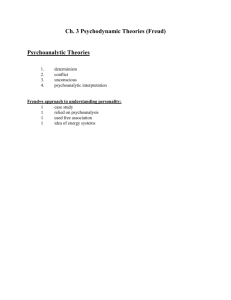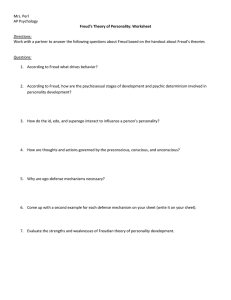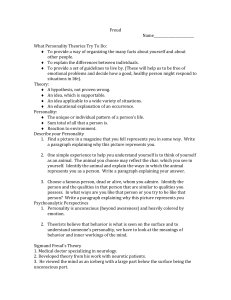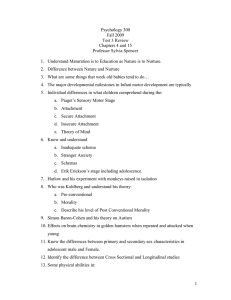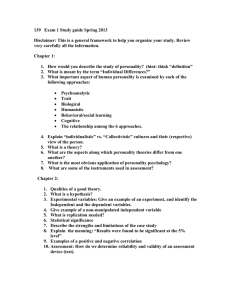1. Psychoanalytic explanation of personality
advertisement
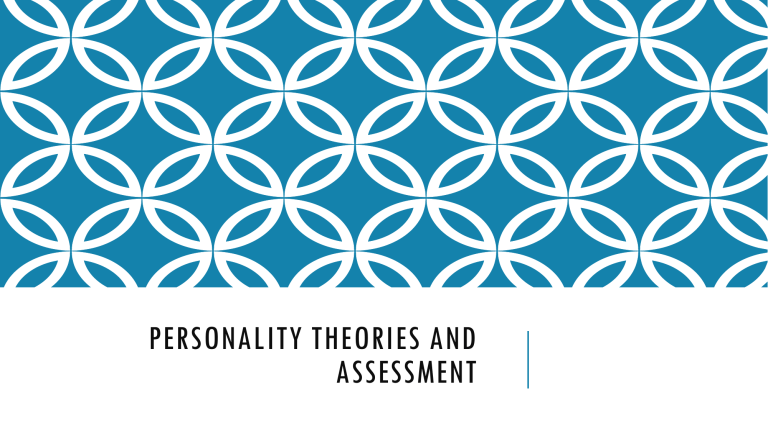
PERSONALITY THEORIES AND ASSESSMENT PERSONALITY A person’s internally based characteristic ways of acting and thinking THE JOURNEY… The Psychoanalytic Approach to Personality The Humanistic Approach and the SocialCognitive Approach to Personality Trait Theories of Personality and Personality Assessment THE PSYCHOANALYTIC APPROACH TO PERSONALITY Freudian Classical Psychoanalytic Theory of Personality Neo-Freudian Theories of Personality FREUDIAN CLASSICAL PSYCHOANALYTIC THEORY OF PERSONALITY FREUDIAN CLASSICAL PSYCHOANALYTIC THEORY OF PERSONALITY Developed by Sigmund Freud in the late nineteenth century and continued until his death in 1939 Freud received a medical degree and established a practice as a clinical neurologist treating patients with emotional disorders Believed sex was a primary cause of emotional problems and was a critical component of his personality theory Remains an important influence in Western culture Write down anything you think you know about Freud FREUD’S THREE LEVELS OF AWARENESS 1. The conscious mind is what you are presently aware of, what you are thinking about right now 2. The preconscious mind is stored in your memory that you are not presently aware of but can gain access to 3. The unconscious mind is the part of our mind of which we cannot become aware It contains, however, the primary motivations for all of our actions and feelings – our biological instinctual drives (such as for food and sex) and repressed unacceptable thoughts, memories, and feelings, especially unresolved conflicts from our early childhood experiences Which one do you think will be dominant? Why? FREUD’S THREE-PART PERSONALITY STRUCTURE Id Ego Superego THE ID Is the original personality, the only part present at birth and the part out of which the other two parts of our personality emerge Resides in the unconscious mind Includes our biological instinctual drives, the primitive parts of our personality located in our unconscious Life instincts for survival, reproduction, and pleasure Death instincts, destructive and aggressive drives detrimental to survival Operates on a pleasure principle; that is, it demands immediate gratification for these drives without the concern for the consequences of this gratification Make a list of at least five urges the id would seek to gratify. THE EGO Starts developing during the first year or so of life to find realistic and socially-acceptable outlets for the id’s needs Operates on the reality principle, finding gratification for instinctual drives within the constraints of reality (the norms and laws of society) Part of the ego is unconscious (tied to the id) and part of the ego is conscious and preconscious (tied to the external world) Serves as the executive manager of the personality What practical concerns might the id have to navigate/account for? THE SUPEREGO Represents one’s conscience and idealized standards of behavior in their culture Operates on a morality principle, threatening to overwhelm us with guilt and shame The demands of the superego and the id will come into conflict and the ego will have to resolve this turmoil within the constraints of reality To prevent being overcome with anxiety because of trying to satisfy the id and superego demands, the ego uses what Freud called defense mechanisms, processes that distort reality and protect us from anxiety Where might our ideas about what is morally permissible originate? FREUD’S DEFENSE MECHANISMS – LACK OF BALANCE BETWEEN PARTS Repression Regression Displacement Unknowingly placing an Not remembering a unpleasant memory or traumatic incident in thought in the unconscious which you witnessed a crime Reverting back to Throwing temper tantrums immature behavior from an as an adult when you earlier stage of don’t get your way development Redirecting unacceptable Taking your anger toward feelings from the original your boss out on your source to a safer substitute spouse or children by target yelling at them and not your boss FREUD’S DEFENSE MECHANISMS Sublimation Replacing socially unacceptable impulses with socially acceptable behavior Channeling aggressive drives into playing football or inappropriate sexual desires into art Reaction Formation Acting in exactly the opposite way to one’s unacceptable impulses Being overprotective of and lavishing attention on an unwanted child Projection Attributing one’s own unacceptable feelings and thoughts to others and not yourself Accusing your boyfriend of cheating on you because you have felt like cheating on him Rationalization Creating false excuses for one’s unacceptable feelings, thoughts, or behavior Justifying cheating on an exam by saying that everyone else cheats UNHEALTHY PERSONALITIES Develop not only when we become too dependent upon defense mechanisms, but also when the id or superego is unusually strong or the ego unusually weak. Can you think of any reasons why this might occur? FREUD’S PSYCHOSEXUAL STAGE THEORY Was developed chiefly from his own childhood memories and from his years of interactions with his patients and their case studies that included their childhood memories An erogenous zone is the area of the body where the id’s pleasureseeking psychic energy is focused during a particular stage of psychosexual development A change in erogenous zones designates the beginning of a new stage Fixation occurs when a portion of the id’s pleasure-seeking energy remains in a stage because of excessive gratification or frustration of our instinctual needs and continue throughout the person’s life and impact their behavior and personality traits FIVE PSYCHOSEXUAL STAGES Oral Stage (birth to 18 months) Anal Stage (18 months to 3 years) Phallic Stage (3 to 6 years) Latency Stage (6 years to puberty) Genital Stage (puberty to adulthood) FREUD’S PSYCHOSOCIAL STATES OF PERSONALITY DEVELOPMENT Stage (age range) Erogenous Zone Activity Focus Oral (birth to 1½ years) Mouth, lips, and tongue Sucking, biting, and chewing Anal (1½ to 3 years) Anus Bowel retention and elimination Phallic (3 to 6 years) Genitals Identifying with same-sex parent to learn gender role and sense of morality Latency (6 years to puberty) No erogenous zone Cognitive and social development Genital (puberty to adulthood) Genitals Development of sexual relationships, moving toward intimate adult relationships POTTY TRAINING Parents try to get the child to have self-control during toilet training If the child reacts to harsh toilet training by trying to get even with the parents by withholding bowel movements, an anal-retentive personality with the traits of orderliness, neatness, stinginess, and obstinacy develops The anal-expulsive personality develops when the child rebels against the harsh training and has bowel movements whenever and wherever he desires. This leads to a personality with cruelty, emotional outbursts, disorganization, self-confidence, artistic ability, generosity, rebelliousness and general carelessness PHALLIC STAGE CONFLICTS In the Oedipus conflict, the little boy becomes sexually attracted to his mother and fears the father (his rival) will find out and castrate him In the Electra conflict, the little girl is attracted to her father because he has a penis; she wants one and feels inferior without one (penis envy) IDENTIFICATION In the process of identification, the child adopts the characteristics of the same-sexed parents and learns their gender role (the set of behaviors expected of someone of a particular sex) It is during identification that the superego begins to develop Do you think children adopt gender roles based on the parents? Why do you think this? EVALUATION OF FREUD’S PSYCHOANALYTIC THEORY OF PERSONALITY Freud’s notion of an “unconscious” level of awareness is not accessible to anyone and is impossible to examine scientifically Indeed, unconscious information processing does impact our thinking and behavior However, the unconscious is not a storehouse of instinctual drives, conflicts, and repressed memories and desires Although early childhood experiences are indeed important, there is little evidence for his psychosexual stages impacting development So where did this idea come from do you think? EVALUATION OF FREUD’S PSYCHOANALYTIC THEORY OF PERSONALITY Contemporary researchers think repression, seldom, if ever, really occurs We understand today how Freud’s questioning during therapy may have created such “repressed’ memories in his patients How might people develop ‘false’ repressed memories? There is evidence we fight hard to maintain self-esteem, but not necessarily through defense mechanisms as Freud described them NEO-FREUDIAN THEORIES OF PERSONALITY Agree with many of Freud’s basic ideas, but differ in one or more important ways. We will be looking at some of these in more detail soon. Carl Jung’s Collective Unconscious Alfred Adler’s Striving for Superiority Karen Horney and the Need for Security RECAP AND CONSOLIDATE What are the id, the ego and the superego? What roles do they perform? What happens when there is an imbalance between these parts of the mind? Describe at least two of the psychosexual stages. What happens if a person cannot move through a psychosexual stage successfully? What are some of the strengths and weaknesses of Freud’s theory? What did Freud mean by ‘repressed memories’? NEO-FREUDIAN THEORIES OF PERSONALITY CARL JUNG’S COLLECTIVE UNCONSCIOUS The collective unconscious is the accumulated universal experiences of humankind, with each of us inheriting the same cumulative storehouse of all human experiences These experiences are manifested in archetypes, which are images and symbols of all the important themes in the history of humankind (e.g., God, mother, hero) Notions of collective unconscious and archetypes are more mystical than scientific and cannot be empirically tested CARL JUNG’S COLLECTIVE UNCONSCIOUS Jung proposed two main personality attitudes, extraversion and introversion Jung also proposed four functions/styles of gathering information Sensing is the reality function in which the world is carefully perceived Intuiting is more subjective perception Thinking is logical deduction Feeling is the subjective emotional function The two personality attitudes and four functions are the basis for the Myers-Briggs Type Indicator, still in wide use today ALFRED ADLER’S STRIVING FOR SUPERIORITY Adler thought the main motivation was what he termed “striving for superiority” – to overcome the sense of inferiority that we feel as infants given our totally helpless and dependent state A healthy person learns to cope with these feelings, becomes competent, and develops a sense of self-esteem Inferiority complex is the strong feeling of inferiority felt by those who never overcome this initial feeling of inferiority KAREN HORNEY AND THE NEED FOR SECURITY Focused on dealing with our need for security, rather than a sense of inferiority A child’s caregivers must provide a sense of security for a healthy personality to develop or else basic anxiety, a feeling of helplessness and insecurity in a hostile world, will result Three neurotic personality patterns Moving toward people A compliant, submissive person Moving against people An aggressive, domineering person Moving away from people A detached, aloof person FINAL REFLECTIONS Do you think any of these Neo-Freudian theories improve upon Freud’s original ideas? In what way? Is there anything we can learn from Freud, or are his idea nothing more than an historical curiosity?
